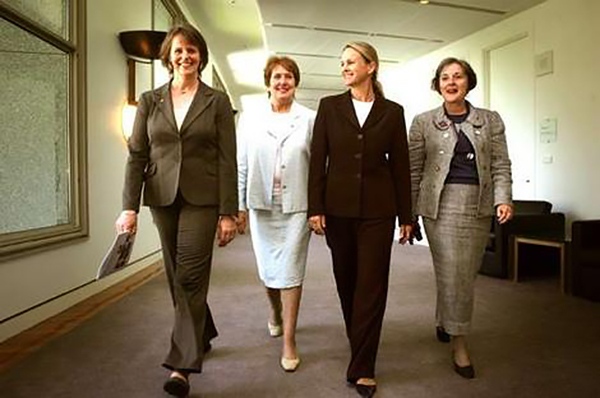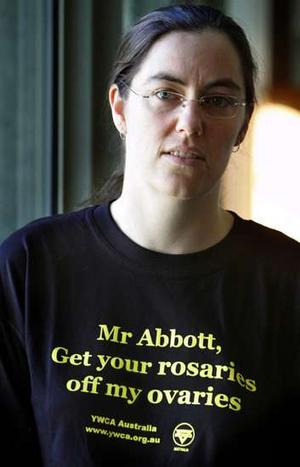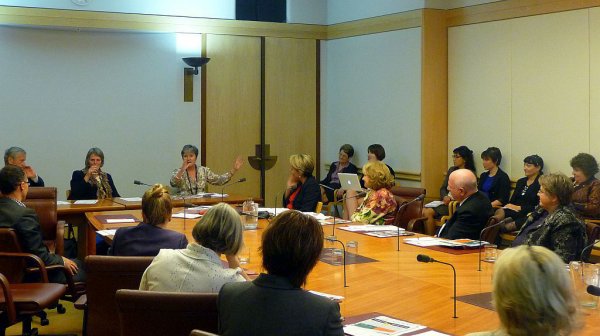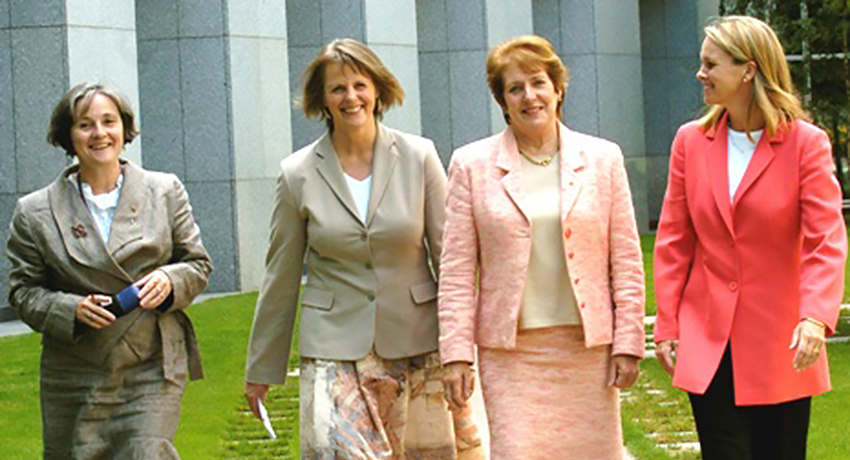In 2006, four women senators from different parties made political history when they worked together across party lines to overturn the ministerial veto on medical abortion drug RU486.
What led these women to collaborate with their political ‘enemies’?
Prior to 2006, RU486 was subject to the Minister for Health’s approval for importation into Australia. Normally, medical drugs are approved by the Therapeutic Goods Administration (TGA) but in 1996 a deal was done by then Prime Minister John Howard with conservative Senator Brian Harradine to allow a ministerial veto on the importation of RU486.
Four women members of the Parliamentary Friendship Group on Population and Development found that across party lines they shared a common view: this veto needed to be removed. Medical abortion is an important alternative to surgical abortion for women in remote communities and for women from religious or ethnic backgrounds who require privacy and confidentiality.
Senators Clare Moore from Labor, Lyn Allison from the Democrats, Judith Troeth from the Liberal Party and Fiona Nash from the Nationals co-sponsored the Therapeutic Goods Amendment Act (Repeal of Ministerial Responsibility for Approval of RU486) Bill 2005 to change the law.

Democrat senator Lyn Allison, Liberal senator Judith Troeth, National senator Fiona Nash and Australian Labor Party senator Claire Moore at Parliament House in Canberra.
Although the amendment was about a TGA technicality, it became a proxy for debate about abortion, and went to a free vote in parliament. Through a tireless combined effort, the four women pushed their amendment into law.
Other women were heavily involved in the process of passing the bill. Senator Ruth Webber was Labor’s ‘numbers person’ for the bill, while the government Whip, Senator Jeannie Ferris, organised the Liberal Party votes.
Through a tireless combined effort, the four women pushed their amendment into law.
Greens Senator Kerry Nettle also worked hard to ensure the bill’s passage and drew media attention by wearing a t-shirt directed at the then Health Minister Tony Abbott’s Catholicism that read: ‘Mr Abbott: get your rosaries off my ovaries’.
An overwhelming majority of women politicians in both houses voted in favour of the RU486 Bill in a conscience vote. The final vote in the Senate was 24 women voting Aye and three voting Noe.

Greens Senator Kerry Nettle.
The bill passed in the House with no Third Reading division, but Parliamentary Library researchers put the percentage of women voting for the bill at 81%.
Whilst women do not necessarily vote on gender lines, their majority support for the bill demonstrated a substantive support of women’s reproductive rights. Women mentioned women in their speeches more than men did. Of the 53 women who spoke in the debates, 23 mentioned ‘women’ in their speeches (a total of 43%), whilst of the 100 men who spoke, 26 mentioned ‘women’ (a total of 26%).
Of the 53 women who spoke in the debates, 23 (43%) mentioned ‘women’ in their speeches … whilst of the 100 men who spoke, 26 (26%) mentioned ‘women’.
The 2006 action, while not the first case cross-party collaboration to occur, catapulted the tactic into the political spotlight, capturing the attention of other legislators. It was also used by women to attempt to change the law on pregnancy counselling services, but failed.
Women’s use of cross-party collaboration highlights the structural gender problems in the Australian political system. Although it is a progressive strategy to work together across party lines, this collaboration was partly born out of necessity and allowed for an alternative way to change legislation.

A meeting of the Parliamentary Group on Population and Development.
So, is collaboration now part of the political repertoire? Is it something women continue to use?
Women are no longer dominating the practice: their work in changing the law in 2006 caused other politicians to take notice. It is generally not the leadership who collaborate, but those with less power who do not have a ministry or shadow ministry of their own.
Women’s use of cross-party collaboration highlights the structural gender problems in the Australian political system.
Politics in Australia has never been a straightforward process, but in recent years politicians have shown a willingness to utilize the strategy of cross-party collaboration, even more so with the entrance of a variety of other parties – and therefore views – into parliament.
Backbenchers are increasingly seeking co-sponsors for bills and motions, and making media appearances with minor party members and independents to promote an issue. The increase in minor parties and independents elected to parliament has helped create an environment more conducive to collaboration.
If the trend continues, the phenomenon of collaboration may eventually be adopted by the leadership of the major parties on issues that can benefit the lives of all Australians.




